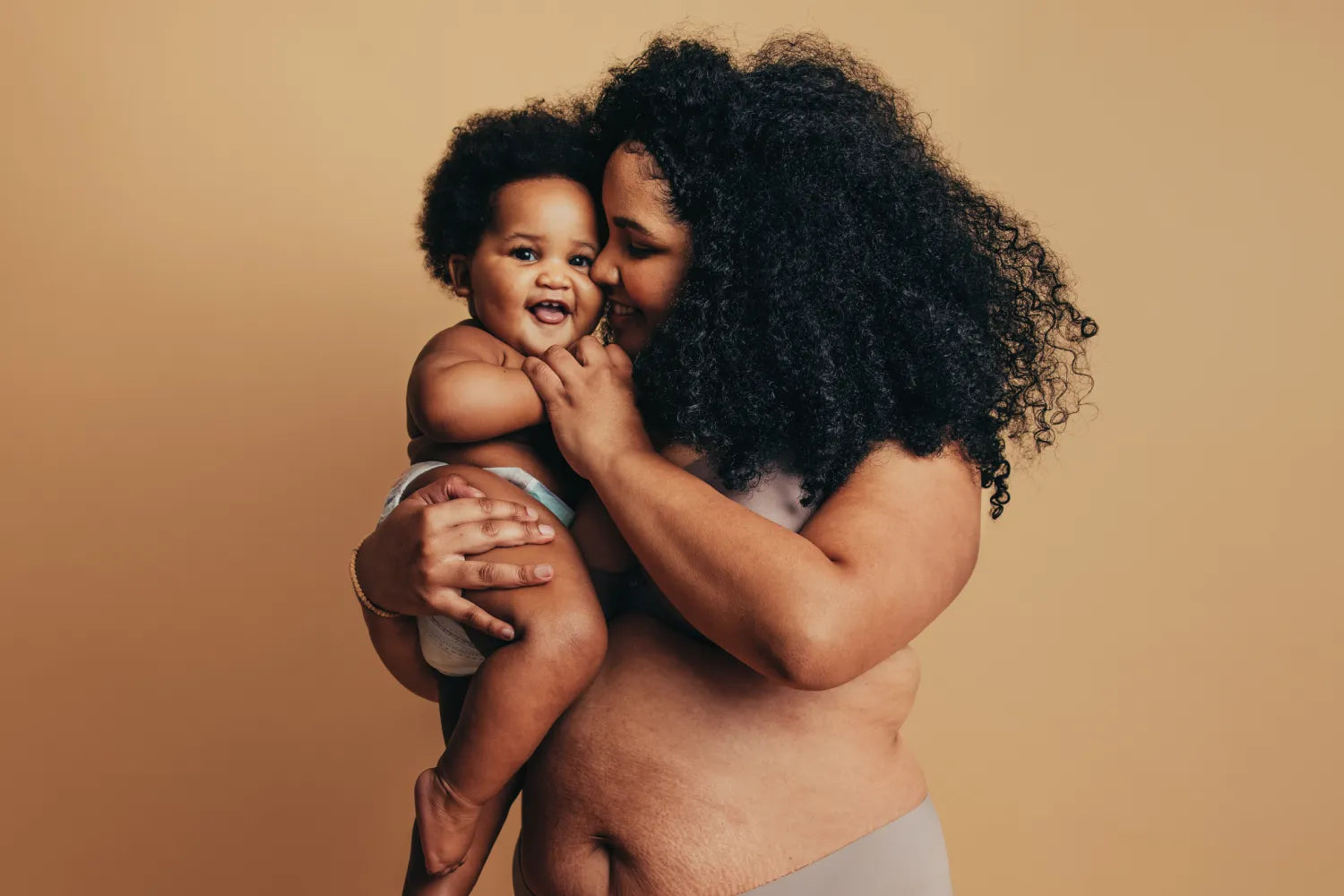The postpartum, or postnatal, state is exciting for new parents but often also confusing. After you give birth, your body has to reset after undergoing so many changes over the last 9 months.
It’s common to wonder when you’ll get your first period postpartum and how long it will last. We’re here to answer all your questions about getting your period back after giving birth so you can focus on your new family.
What Are the Phases of the Postpartum Period?
The postpartum period is approximately eight weeks after giving birth, so it’s sometimes called the fourth trimester. It is important to understand that your body won’t immediately bounce back to its pre-pregnancy state.
You’ve been growing another life inside of you, which takes a lot of bodily resources and effort, so post-pregnancy, expect hormonal changes, shedding of uterine tissue and placenta, and a need for extra rest.
During the postpartum period, your body will undergo physical changes that roughly correspond to three phases: the acute, subacute, and delayed postpartum periods.
Acute Phase
The acute phase defines the immediate time after giving birth and stretches the first 24 hours. This is a crucial time to be monitored for safety and wellness, as issues can arise during the first hours after birth. For example, the risk of postpartum hemorrhage and eclampsia is highest. Your body will start discharging excess fluids right away.
Subacute Phase
The subacute phase is the next two to six weeks postpartum. During this time, you’ll experience the three stages of postpartum bleeding (also called lochia) that start with heavy, bright red bleeding and taper off to watery discharge.
You will also experience hormonal changes, emotional changes, and overall recovery. After six to eight weeks, your body may have nearly fully returned to its post-baby state.
Delayed Phase
The delayed postpartum period refers to roughly eight weeks to six months after giving birth, which is considered the full extent of postpartum. Yet, some people with vaginas experience changes after eight weeks.
When Do You Get Your First Postpartum Period After Birth?
You’re probably curious about when you’ll get the first period after giving birth because going 9+ months without menstruation is a major perk of pregnancy. The answer depends on a few factors, but mainly whether you breastfeed or bottle feed. Generally, if you’re not breastfeeding, your period returns six to eight weeks after delivery (after completing lochia).
But if you breastfeed, during the time before you formula feed, you may prevent a menstrual cycle through a process called lactational amenorrhea. When your baby drinks breast milk, their suckling triggers the hormone prolactin, which holds off ovulation.
Because of this, you can’t get pregnant while breastfeeding, which is called the lactational amenorrhea method (LAM). Yet, if you want to use this as a birth control method, make sure you exclusively breastfeed and switch to another birth control method after six months.
After you conclude breastfeeding, your period will likely return. In most cases, this happens about five or six months after birth, when the baby starts to wean off your milk supply.
Is It Normal To Experience Irregular Periods After Childbirth?
When your period does come back, it might not fit into a neat box, even if it did before you got pregnant. Every person with a vagina understands that menstrual cycles can fluctuate and change from one month to the next. Regardless of whether you use a hormonal birth control method or not, menstruation can vary in length, frequency, and heaviness.
After giving birth, it will likely take your body some time to regulate your periods. If you had irregular cycles before pregnancy, they may continue to be inconsistent postpartum. During the first few periods after giving birth, you might experience more cramping and different colored blood. But over time, your periods will return to what is normal for you.
How Long Will Your Period Last?
Menstrual cycles between 21 and 35 days are considered normal and vary depending on the person. Although your period may be a bit irregular the first few cycles postpartum, it should soon fall within this timeframe.
How Can You Differentiate Between Postpartum Bleeding and Your First Period?
Postpartum bleeding happens to everyone in the days and weeks after they give birth, regardless of whether it’s a c-section or vaginal delivery. Immediately after giving birth, you’ll start experiencing cramping and bleeding as your uterus contracts and sheds the excess blood, uterine lining tissue, placenta, and fluids used during pregnancy.
Lochia can include blood clots, and the discharge will change from red to brown over time. But this isn’t the same as having a period. For this, you can lean into a gentle New Mom Ritual that includes pads for heavy flow.
You can understand the difference based on the timing. You know lochia bleeding will happen immediately after birth for up to four weeks. On the other hand, your period will last only a week or so and won’t begin until after lochia has concluded.
What Will the First Period After Giving Birth Be Like?
Because your post-baby body has to adapt, your first periods after giving birth may be a little different than before, possibly more intense or possibly easier. You might experience stronger cramping and more painful periods. On the other hand, your period might feel more manageable than pre-pregnancy.
However, as your uterus returns to its regular size and your body sheds excess materials, it’s common to have heavy periods and heavy bleeding at first. Eventually, expect your period to return to normal.
When Can You Use Tampons After Giving Birth?
Because your vagina is like a healing wound in the weeks after giving birth, wait for at least six weeks to avoid new tears and infection. Definitely ensure you’ve finished postpartum bleeding before using a tampon.
It’s best to consult with your doctor about how well your vaginal healing is going before adding tampons to your routine.
When Should You Talk to Your Healthcare Provider?
Other than your routine post-birth checkup with your doctor, you should also consult a medical professional like a doctor or OB/GYN if you experience any abnormalities. These would include excess blood loss, large clots (they can range from quarter size to golf ball size, which is definitely a concern), and implantation bleeding (which could indicate pregnancy).
If you experience extreme period pain, trouble with lactation, or pelvic pain, make sure you mention it in your postpartum checkup.
Making the Postpartum Period Go Smoothly
It’s important to take care of yourself during postpartum recovery because childbirth is a form of trauma on the body. Not knowing what to expect after giving birth can create stress and confusion.
But now that you know when to expect your first period, you can put your worries aside and show your honey pot some much-deserved love with our line of menstrual products.
Sources:
Periods and Fertility in the Menstrual Cycle | NHS
Physiology, Postpartum Changes | National Library of Medicine
Postpartum Contraception: The Lactational Amenorrhea Method | National Library of Medicine
Postpartum Period: Three Distinct But Continuous Phases | Journal of Prenatal Medicine






